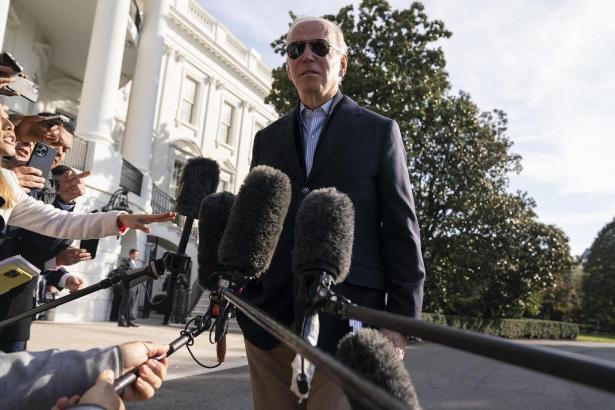Joe Biden hasn’t been faring all that well in the polls for most of the past two years, but the one splashed over the front page of today’s Washington Post is the unkindest one of all.
It begins by asking whether respondents believe Biden has accomplished “a great deal” or “a good amount” or “not very much” or “little or nothing” in his first two years as president. A bare 36 percent answered “a great deal” or “a good amount,” while a not-so-bare 62 percent opted for “not very much” or “little or nothing.” Predictably, most Democrats—77 percent—were among that 36 percent of the approving public, while just 7 percent of Republicans were. Among independents, however, the breakdown was 32 percent on the plus side, 66 percent on the minus.
Polled on the specifics of Biden’s achievements, Americans came up with essentially the same responses. Did he create “more good jobs in your community”? Only 34 percent said yes. Improve roads and bridges? 32 percent. Lower prescription drug costs? 30 percent. Make electric cars more affordable? 26 percent.
To be sure, these underwhelming numbers are partly due to Biden’s programs only now beginning to kick in. Roads and bridges will take a while. The $35 monthly cap on out-of-pocket insulin expenses only took effect last month.
But there are deeper reasons for this troubling disconnect. For one thing, some of Biden’s proposals only made it through Congress in slow and fragmentary forms. Medicare will be able to bargain down the prices of prescription drugs, but not for several years, and then, just ten of those drugs.
Moreover, Biden’s real achievements—massive tax credits for companies that invest in green energy, funding for semiconductor and other domestic factories, and, yes, shoring up those roads and bridges—won’t become visible to the untrained eye for some time, if indeed ever. Franklin Roosevelt understood this dynamic when he redirected some funding away from the massive projects (like building the Boulder Dam) of the Public Works Administration to the nonmassive but job-heavy projects of the Works Progress Administration. His chief reason was that, with unemployment at 25 percent, he needed to get millions of Americans to work ASAP, even if that work simply consisted of paving roads or sprucing up parks. But he also understood that the more immediate the job creation, the better the consequence politically.
Now, Biden can claim an almost FDR-like record for job creation in his first two years; that’s why unemployment is lower than it’s been in nearly 60 years. But that was the result of his initial $1.9 trillion economic recovery package that passed at the start of his presidency, which was both coupled and coincided with inflation. If that inflation continues to subside and unemployment remains low, some of Biden’s numbers should rise a bit—perhaps enough to get him re-elected. But that’s no sure thing, particularly since the media—and not just the mainstream media—hasn’t really looked at the massive job creation effects that that legislation brought with it.
Problem is, those parts of the Biden agenda that would have had a greater impact on public consciousness—the Child Tax Credit, paid sick leave, free public college tuition, and such—ended up on Joe Manchin’s cutting-room floor. The parts that made it through—revived industrial policy, green-energy investment, infrastructure—were chiefly capital expenditures, to which it’s not clear that the public pays that much attention. FDR is remembered for establishing Social Security and the federal minimum wage, and legalizing collective bargaining, more than he’s remembered for the dams and airports he funded. Dwight Eisenhower was a popular president, but I don’t know how much of his popularity hinged on the creation of the interstate highway system he authorized, and which took decades to complete.
It was to rectify such pervasive unappreciation, Biden’s aides may believe, that the State of the Union address was created. We’ll see how that goes later tonight.
===
Harold Meyerson is editor at large of The American Prospect.


Spread the word